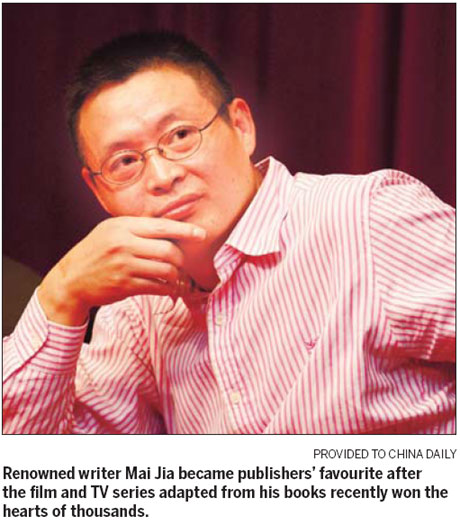The write way to fame
(China Daily)
Updated: 2010-05-06 11:00
 |
Large Medium Small |

An award-winning writer who has been called China's Dan Brown, talks about his works and his preferences.
Mai Jia shot to stardom after the TV series Plot Against, adapted from one of his novels, became one of the top shows last year.
Last month, Mai, 46, stunned the publishing industry when he was given a 5 million yuan advance for his new novel, Wind Talk, which will be published at the end of this month.
Q: Some people said that you are China's Dan Brown. What do you think about that?
A: They flatter me. Dan Brown is famous. I'm just a stubborn writer who keeps at it even though I have been writing for more than 10 years.
I rose to fame in recent years because my works were adapted for the television and cinema. But fame is not good for me because I need to be alone to write.
Dan Brown is not my idol and our novels are different. He writes specialized kinds of novels but I try to avoid that. I have a so-called "pure literature" sentiment. I won't give up my pride to do that and actually I am not capable of doing that.
Q: Ten years ago, your two novels, Decryption and Plot Against were rejected, but now a publisher has given you a 5 million yuan advance for Wind Talk. What do you think about that?
A: Many publishers do not publish a book because of its quality, but because of the fame of the writer.
It is very difficult for a new writer to get published these days, which is sad and depressing.
Many years ago, publishers rejected my books but today people are queuing to publish the words that are still in my head.
I feel my writing is getting worse. Publishers exalt me only because I have built up a superficial reputation.
Really valuable and good works from unknown writers are sometimes locked away in drawers or are posted online.
Q: In recent years, there have been some unfortunate problems in the publishing world, with poets committing suicide and young writer's trading sex for money. What is your advice to writers who have dreams of being published but are still unable to do so?
A: The best attitude for a writer is that he should be satisfied without getting famous, and that he is able to refuse temptation after becoming famous.
Literature is something about a person's spirit, so do not expect it to change your material life.
A writer may easily get hurt if he has the wrong attitude. I have never attempted to get rich by writing. It just turned out to be so. Therefore, I do not expect this situation will continue indefinitely.
Q: Because of your work, the spy-detective genre has become popular on TV. What do you think about it?
A: The reasons are complicated, but it could be because real-life crime stories are often suppressed, so fictional stories become attractive to the public.
Q: How does Wind Talk differ from your other works?
A: Wind Talk is based on some historical facts so it may have a heavy sense of history. For example, I want to use the process of Chen Jiahao (the book's main character) growing up in pain to express the special suffering and destiny of Chinese intellectuals during a particular period.
I did lots of research to help develop the story and characters along historical lines. I made the effort but still don't know whether it works.
Plus, seven different cipher codes are featured in the book, as well as the history of global coding. If TV is able to show this in an exciting way, it will be interesting.
Q: Do you have any expectations for the TV production of Wind Talk?
A: No. I always let the TV producers have their go at the book. I am responsible only for writing the book. The TV series has a 35-million yuan investment, and the director and leading actors are solid. But all of these cannot guarantee success. There are many elements beyond control, such as which station it's on and its telecast time.
Q: You have said you won't write about decoding experts again. So will you write about other kinds of spy stories for TV?
A: It is hard to say. But to be honest, I do not want to write any more TV scripts in the future. It is too exhausting and I may write just novels and film scripts. I am not young and should stay away from intense work.